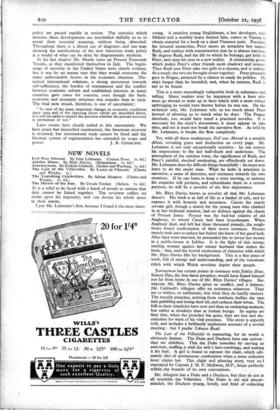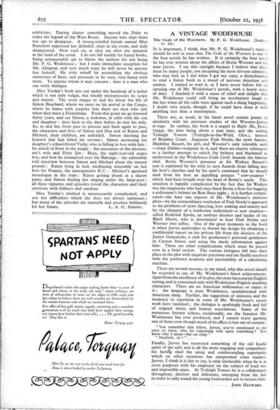NEW NOVELS
Evil Was Abroad. By John Lehmann. (Cresset Press. 7s. 6d.) Jubilee Blues. By Rhys Davies. (Heinemann. 7s. 6d.) Journeyman. By Erskine Caldwell. (Seeker and Warburg. 75. 6d.) The Last of the Villavides. By Louise de Vilmorin. (Chatto
and Windus. 5s.) The Vanishing Celebrities. By Adrian Alington. (Chatto and Windus. 7s. 6d.) The Mirror of the Sun. By Ursula Torday. (Nelson. 7s. 6d.)
IT is a relief to be faced with a batch of novels so various that they cannot be linked together. The reviewer suffers no strain upon his ingenuity, and can devote his whole space to their merits.
I put Mr. Lehmann's first, because I found it the most inter- esting. A sensitive young Englishman, a late developer, with Oxford and a wealthy home behind him, comes to Vienna to obtain material for a book on a dead Viennese poet. Pursuing his leisured researches, Peter meets an attractive boy nameu Rudi, and realises with consternation that he is almost starving. By degrees Rudi, and the life to which he belongs, get hold on Peter, and open his eyes to a new reality. A relationship grows which makes Peter's other friends seem shadowy and remote. Then Rudi sees Peter take two girls to a cinema, and is jealous. As a result, the two are brought closer together. Peter presently goes to Prague, attracted by a chance to study its politics. He stays longer than he intended, and, when he returns, Rudi is not to be found.
This is a story exceedingly vulnerable both in substance and telling. Many readers may be impatient with a hero who must go abroad to wake up to facts which with a more robust upbringing he would have known before he was ten. On the technical side, Mr. Lehmann tells us too much about Peter instead of allowing us to watch what he does. The Prague interlude, too, would have taxed a practised novelist. It is necessary for the story's dinoitement, it must appear to take time, and yet it must not break the narrative flow. As told by Mr. Lehmann, it breaks the flow completely.
Yet, with all these weaknesses, Evil was Abroad is a notable debut, revealing grace and distinction on every page. Mr. Lehmann is not only exceptionally sensitive : he can convey his impressions to the last half-shade and undertone. The atmosphere of the stricken town, the significance of Rudi, and Peter's painful, shocked awakening, are effortlessly set down. Mr. Lehmann does the difficult things beautifully : he must now learn to do the easier ones. What he lacks is precision in narrative, a sense of direction, and sternness towards his own creations. If he can learn to keep a story moving, to animate his exquisite still pictures, and subordinate them to a central purpose, he will be a novelist of the first importance.
Mr. Rhys Davies knows as novelist all that Mr. Lehmann doesn't. His book is as full of life as a basket of eels, and he exposes it with honesty and assurance. Lassie, the sturdy servant girl, though a match for the young men who climbed in at her bedroom window, had no defence against the charm of Prosser Jones. Prosser was the bad-hat relative of old Anglesey, to whom Cassie had been housekeeper. When Anglesey died, and left her three thousand pounds, the neigh- bours found confirmation of their worst surmises. Prosser merely took care to seduce her before she knew of her good luck. After they were married, he persuaded her to invest her money in a public-house at Jubilee. It is the fight of this strong, sterling woman against her waster husband that makes the book : that, and the horrid exuberance of character with which Mr. Rhys Davies fills his background. This is a fine piece of work, full of energy and understanding, and of the venomous relish with which Welsh novelists depict their people.
Journeyman has certain points in common with Jubilee Blues. Semon Dye, the free-lance preacher, would have found himself not far from home in one of Mr. Rhys Davies' villages. But, whereas Mr. Rhys -Davies gives us conflict, and a balance, Mt. Caldwell's villagers offer no resistance whatever. They are so witless, so subhuman, that what they do hardly matters. The rascally preacher, arriving from nowhere, bullies the men into garn- bling and losing their all, and seduces their wives. The folk in their simplicity have now and then an endearing moment, but rather as monkeys than as human beings. So supine are they that, when the preacher has gone, they are lost and dis- consolate for want of his vital presence. The story is expertly told, and includes a brilliantly unpleasant account of a revival meeting : but I prefer Tobacco Road.
The Last of the Villavides- is reassuring, for its world is obviously fantasy. The Duke and Duchess have one sorrow : they are childless. This the Duke remedies by carving an armchair, stuffing it with his wife's hair-combings, and making it his heir. A girl is found to espouse the chair, which ulti- mately dies of spontaneous combustion when a more orthodox lover claims her. This slight and pleasing story, very we 1 translated by Captain J:H. F. McEwen,, M.P., keeps perfectly within the bounds of its own conventions.
Mr. Alington has a Duke and a Duchess, but they do not at all resemble the Villavides. - The Duke is old and absent- minded, the Duchess young, lovely, and fond of collecting
celebrities. During dinner something moved the Duke to relate the legend of the West Room. Anyone who slept there was apt to disappear. A strong-minded female named Miss Ramshott expressed her disbelief, slept in the room, and duly disappeared. Now read on, as they say after the synopsis at the head of the serial. I do not fall readily for funny books, being unreasonably apt to blame the authors for not being Mr. P. G. Wodehouse ; but I make immediate exception for Mr. Alington, and very mitch hope he will never be anyone but himself. He risks rebuff by assembling the obvious characters of farce, and proceeds to be very, very funny with them. To anyone whom it may concern : here is a man who can write dialogue.
Miss Torday's book sets out under the handicap of a jacket which is not only vulgar, but wholly misrepresents its scope and matter. The story ranges to and fro about the life of Simon Bouchard, whom we meet on his arrival in the Congo, where he learns with surprise that there are men who spit when they meet a Frenchman. From this point we go forward thirty years, and see Simon, a widower, at odds with his son and daughter : then back to the days before he met his wife. So, to and fro, from past to present and back again to past, the characters and lives of Simon and Elsa and of Karen and Michael, their children, are unfolded. Simon shooting the leopard that had killed his servant ; Simon answering his daughter's school-friend Vicky, who is falling in love with him : his attack of fever in the jungle : the encounter of the mission- ary's wife and Dirty Jim : Buya, the eight-year-old negro boy, and how he triumphed over the Bakongo : the admirably told interview between Simon and Michael about the twenty pounds : Karen lying in bed, meditating miserably on her love for Francis, the unresponsive K.C. : Michael's agonised monologue in the train : Karen getting drunk at a sherry party, and Simon finding her singing under the lamp-post : all these vignettes and episodes reveal the characters and their emotions with fullness and candour.
Miss Torday's method is unnecessarily complicated, and sets her difficulties which she does not always surmount ; but many of the episodes are masterly and promise brilliantly
















































 Previous page
Previous page